One of the definitions of the word feminist is: “the belief that women and men should have equal rights and opportunities.” Does this describe God? My mom was a pastor for 13 years. Did God have a problem with that? Is what she did contrary to the teachings of the Bible?
I have been exposed to Christian leaders, churches and organizations who would encourage women to lead in the church and those that would prohibit it. I have friends and mentors who hold strong ‘complementarian’ (as the male only leadership advocates refer to themselves) and ‘egalitarian’ (as those who support women in church leadership are referred to) convictions. For as long as I can remember I’ve wrestled with the issue of whether the Bible teaches that it is God’s will and design for men (and only men) to have the authoritative ‘role’ of leadership, teaching and preaching in the church. I’ve read books and articles from both positions and tried to keep an open mind. I’ve listened to sermons and explanations from those on both sides of the debate. Is the ‘male only position’ God’s will and clearly taught in the Bible? Or is it possible that scripture has been misinterpreted to support a culturally influenced male dominated system, reflective of thousands of years of world history?

After a lot of reading, thinking, listening, discussing and praying I’ve finally concluded that as Biblical scholar, theologian and pastor Greg Boyd says, it is “God’s ideal will for people to exercise whatever gifting they have in the body of Christ and in society regardless of their gender.”
Here are some common arguments male leadership advocates argue and why I cannot agree:
“Women are equal in essence and being but not in function or role.”
This is the party line of reason in describing how women can be so limited but entirely equal. But after further thought, this logic doesn’t make much sense! A role is “the function assumed or part played by a person or thing in a particular situation”. It is assumed for a specific period of time for a purpose and goal. It is not tied to who a person is at their very nature of being! It does not last forever without re-evaluation! Isn’t it interesting that women cannot exercise authority or teach in order to live out their God-given feminine attributes but there are no human activities males cannot do to live out their God given masculinity? Of course men cannot naturally bear or nurse children but this is a biological, personal inability and not permission denied (women have the biological capacity and capability to teach, lead and make decisions). Rebecca Merrill Groothuis writes that “The full humanity of womanhood is not honoured or recognized when what is deemed constitutive of femininity is shared by the lower species [animals] while what is deemed constitutive of masculinity is unique to the human species.”
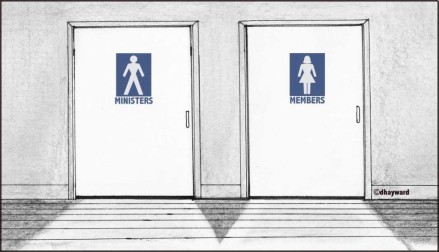
It could very well be that this is a much deeper issue than church function but one of women’s equality as persons!
Groothuis also writes: “If God’s word makes it clear that women are not ontologically inferior to men, and if the permanent, comprehensive and necessary subordination of women logically implies the ontological inferiority of the female gender, then we must conclude that God has not decreed such a thing and that biblical texts understood to convey such a decree have been wrongly interpreted.”
“Egalitarians (those who hold that men and women are equal and equally called to church leadership) do not respect Biblical authority and deem what they don’t want to believe in the Bible as ‘cultural’.”
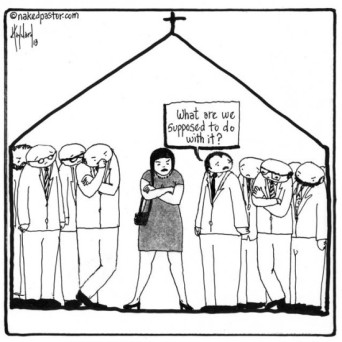 It should be clearly stated that the issue of women in ministry is not one of questioning Biblical authority but differing in Biblical interpretation. If egalitarians are guilty of picking and choosing what is cultural then male only leadership advocates are equally guilty! If we apply the New Testament passages dealing with women at face value and as transcultural than why do we allow women to sing worship songs or pray out loud? Why do we ignore clear commands by the Apostle Paul and Jesus himself? Shouldn’t the “holy kiss” (commanded five times) be a norm at our churches?! Why do we allow women to braid their hair, wear jewellery or pray with their heads uncovered? Why isn’t every church giving money to the church in Jerusalem or having mandatory foot washing sessions? These are all clear commands in the New Testament! Of course the Bible was written to specific people for a specific time. It is important for us to pull out the enduring elements of these commands and understand the original reader’s situation before we blindly apply it as transcultural, timeless truth. We must be consistent in how we approach this.
It should be clearly stated that the issue of women in ministry is not one of questioning Biblical authority but differing in Biblical interpretation. If egalitarians are guilty of picking and choosing what is cultural then male only leadership advocates are equally guilty! If we apply the New Testament passages dealing with women at face value and as transcultural than why do we allow women to sing worship songs or pray out loud? Why do we ignore clear commands by the Apostle Paul and Jesus himself? Shouldn’t the “holy kiss” (commanded five times) be a norm at our churches?! Why do we allow women to braid their hair, wear jewellery or pray with their heads uncovered? Why isn’t every church giving money to the church in Jerusalem or having mandatory foot washing sessions? These are all clear commands in the New Testament! Of course the Bible was written to specific people for a specific time. It is important for us to pull out the enduring elements of these commands and understand the original reader’s situation before we blindly apply it as transcultural, timeless truth. We must be consistent in how we approach this.
Dr. David Schlor wrote “Why is it that so many persons insist that 1 Timothy 2:11–12 is a transcultural, absolutely normative text, but at the same time do not approach other texts in 1 Timothy with the same passion? Pressed in the same way, 1 Timothy 3:2 would rule out all single men from ministry, and 1 Timothy 5:3–16 would require churches to establish ‘orders of widows’ for those sixty and older and would require that all widows fifty-nine and under remarry for the reasons of their sensual desires and idleness.”
The man has a point.
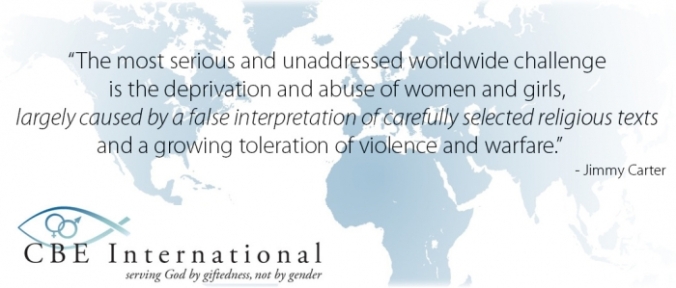
“God clearly desires that men be in charge and shows us this throughout the Bible. It is simple.”
This same line of thought was used by Christians to justify slavery for hundreds of years.
If God clearly desired men alone to lead and exercise authority then why do we see so many examples of the opposite in the New Testament!? Paul (the same man who supposedly restricted women) commended many women throughout his letters! Paul praised a woman named Junia and labelled her an apostle! Phillip’s four daughters were respected prophets (some scholars believe that the early church viewed prophets as one of the highest positions in the church). Paul commended a woman named Phoebe and called her a deacon. Priscilla (along with her husband Aquilla) was praised by Paul in three of his letters. In the book of Acts she taught a young, confused, male church leader about the “way of God”. It is also of significance that in almost every reference to Priscilla in scripture her name is placed before her husband’s which was against cultural protocol. This may show that Priscilla was more involved with the leadership of the church than her husband. Euodia and Syntyche of Philippi are labelled co-workers of Paul (a term Paul uses to describe various men). Lydia, Nympha and Chloe are mentioned in the New Testament and may have been house church leaders. I could share many other examples from the Old Testament but I think you get the point.
Even if God desires that only men have authority (I admit I could be wrong), the application of this is far from simple! Can women teach in seminaries or classrooms or are they only barred in church? Can men read books or Bible commentaries authored by women since this could be classified as being taught by women? Can women lead worship, sing in church or pray out loud at all? Can women be children’s pastors or associate pastors as long as they don’t hold all of the authority? Can a woman teach a 14-year-old boy or does manhood start at 13? Can women “share” at a Bible study or is that teaching? Can women preach if they are under the “authority” of a man in the same room? How do we apply these restrictions to different cultures around the globe? Is the application the same in Canada as it is in North Africa? Sweden as it is in Argentina? In China as Afghanistan? For years women have been able to be missionaries with the church’s blessing in foreign countries. These women often took part in preaching, teaching and leading but were not allowed to do the same activities when they returned home. Why is that?!
Things are not as simple as they seem.

“1st Timothy 2:12 (“I do not permit a woman to teach or to exercise authority over a man; rather, she is to remain quiet.”) obviously ends the argument.”
Does it though? What strong circumstances in Ephesus could have warranted such strong words from a man who in other contexts greatly encouraged women!? Isn’t it significant that there was a large female goddess temple in Ephesus which included female priests and temple prostitutes? How do we harmonize this verse with others where Paul encourages women to speak in church? Professor Gail Wallace asks the question “Do you think the women Paul worked with and commended in Romans 16 were required to be quiet in church and had no authority?” If Paul was so clear on women’s subordination then why did he only mention it in two of his letters? If this passage is transcultural than why don’t we take 1st Timothy 2:15 (which discusses women being saved through childbearing) as transcultural? It’s possible that this verse could better be translated as “I am not currently permitting” indicating a temporary prohibition for specific reasons. Shouldn’t we consider that the Greek word for authority in this passage is only used once in the entire Bible and can also mean “to dominate”? Greg Boyd writes that “It’s never a good idea to base transcultural church doctrines on words that only occur once in the New Testament, especially when they seem to contradict the clear teaching of Scripture in other contexts.”
There are plenty of reasonable explanations by respected Biblical scholars as to why Paul would have written these words considering his original audience and setting. When we emphasize passages like this (and 1st Corinthians 14:34) we deemphasize the completely radical and progressive attitude that the New Testament showed towards women. Amongst other things, the New Testament commanded that women should be educated and that they had authority over their husband’s bodies!
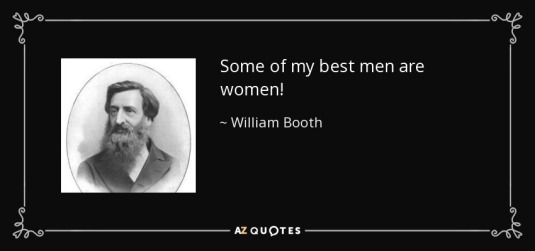
“The idea that God would want a woman to have authority in his church is a liberal feminist lie.”
Many people are under the persuasion that women in ministry only began as a result of the secular “second wave” feminism after the revolutionary 1960’s. It should be noted that there were several Christian movements (including Methodists, the Church of the Nazarene, the Salvation Army, Quakers, Mennonites, Pentecostals, some Baptist and Presbyterian groups, and the Evangelical Free Church) that allowed women to preach, lead and teach prior to the widespread “secular” feminist movement. It is also important to recognize that several North American conservative, evangelical leaders in the late 1800’s and early 1900’s who fought against liberal theology (and were often labelled fundamentalists) endorsed women in ministry! D.L. Moody, A.B. Simpson, A.J. Gordon, and William Bell Riley all founded Bible Institutes which trained men and women to preach the gospel, teach the Bible and lead local churches. During this time and in these circles it wasn’t uncommon for women to be on leadership committees, school faculties and speak at important conferences. Gail Wallace clarifies that “It would be a mistake to say that all of these men advocated for biblical equality in the way that we think of it now, but their endorsement of women in public ministry roles shattered cultural stereotypes of their day. They were not afraid to take a stand, in spite of opposition.” From 1859-1926 there were at least ten documents published which defended women in ministry from a Biblical stand point. It was only beginning in the 1930’s that many groups changed their attitude towards women, largely as a reaction to the secular women’s movement.
Some of the most influential, respected male Bible scholars and theologians of the past 100 years endorse(d) women in ministry. These include F.F. Bruce, I. Howard Marshall, R.T. France, John Stott, Leon Morris, Dallas Willard, Michael Bird, Gordon Fee, N.T. Wright, Richard Hays, Roger Nicole, Craig Keener, Ben Witherington III, Roger Olson and Stanley Grenz. Anyone who knows anything about Biblical scholarship or theology will tell you that these men are not “liberal feminists” who twist the Bible as they ignore it! I hope it is clear that supporting women in ministry is not some liberal, secular infiltration of the church but a belief that has persisted for over 150 years by those with the highest respect for scripture.
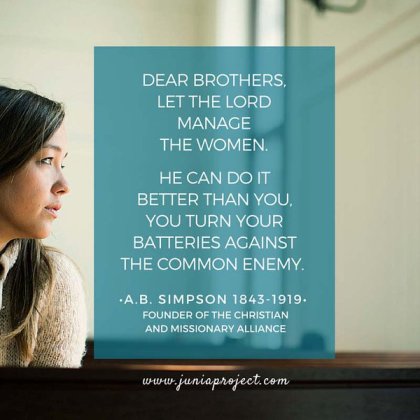
“Those who accept women in ministry are embarking on a slippery slope of liberalism.”
This poor argument is spread out of fear and does nothing but promote more fear. It hardly warrants rebuttal. Once again, this issue is not one of questioning Biblical authority but rather differing Biblical interpretation. N.T. Wright says that “We have to claim the freedom, in Christ and in our various cultures, to name issues one by one with wisdom and clarity, without assuming that a decision on one point commits us to a decision on others.”
“Jesus chose 12 disciples and they were all men.”
This is true. All 12 were also Jewish. Perhaps we should create a ban on all non-Jewish preachers! Many of the things Jesus did were very prophetic and symbolic (see the entire book of Matthew). It isn’t a coincidence that he chose 12 male disciples when there were 12 tribes (named after patriarchs of Israel) of Israel. Jesus’ treatment of women was completely revolutionary. He spoke to them, taught them, loved them and respected their humanity in a way that was scandalous in 1st century Jewish society (especially for a religious teacher!). At the time there was a common prayer by Jewish rabbi’s which thanked God that the speaker was not a dog, a barbarian or a woman. Jesus completely rejected this and included many women amongst his disciples! He spoke to women, much to the confusion of his male disciples (see John 4). Jesus had women disciples who financially supported his life! The resurrected Jesus revealed himself to his female disciple’s first! God entrusted women to be the first people to tell others that Jesus was alive. Jesus encouraged women to sit at his feet rather than conform to the societal expectation that they serve men. We see this in the story of Mary and Martha. N.T. Wright comments that something significant is happening here: “As is clear from the use of the phrase elsewhere in the New Testament (for instance, Paul with Gamaliel in Acts 22:3), to sit at the teacher’s feet is a way of saying you are being a student, picking up the teacher’s wisdom and learning; and in that very practical world you wouldn’t do this just for the sake of informing your own mind and heart, but in order to be a teacher, a rabbi, yourself.”
“People who advocate for women in ministry claim that there is no difference between the genders.”
This is not necessarily true. The New Testament is clear that men and women need each other! Although there are differing views on this subject amongst those who advocate for women in ministry, many wholeheartedly embrace that men and women are different. This is why one of the greatest books to defend women in ministry is entitled “Discovering Biblical Equality: Complementarity Without Hierarchy”. These differences are seen as valuable. They should be embraced and used for the mutual benefit of the church and the world! Rachel Held Evans writes “I’m egalitarian, and I believe there are differences between men and women too. Some are (clearly) biological, others are (possibly) biological, and still others are socially conditioned. What makes me egalitarian is the fact that I do not believe those differences to be universal, prescriptive, or indicative of hierarchy.”
Conclusion
I did not write this blog to cause unnecessary tension or divide the church. I do not mean to attack the views of those who disagree with my conclusion. For a long time I avoided the topic out of fear of causing unnecessary heated arguments amongst friends.
I can no longer be silent.
According to a 2011 Pew Research report there are over 1 billion professing Christian women around the world. This is not a “secondary issue” that can be ignored. This is not a “women’s issue” so much as it is everyone’s issue. This is a major matter that affects over one billion people daily (not counting the negative effect male only leadership has on men and on non-Christian men and women). It is something that needs to be addressed, discussed and acted upon by those claiming to follow Jesus! My sincere prayer is that all believers will be open to fresh, prayerful, humble discussion and to the possibility that their interpretation of the scriptures is not what God intends for humanity.
To those friends, brothers and sisters that disagree with me, I pray that we can participate in humble, irenic dialogue and remain unified in advancing the kingdom of God on earth. There have been far too many people hurt, friendships forfeited, churches split and opportunities to advance the gospel lost over important issues like this one.
Further Reading
There are also many other arguments complementarians use to support their position (the supposed hierarchy in the Trinity, Adam and Eve’s relationship in Genesis 1-3 and passages in 1st Corinthians). This blog is already too long and there have been great books and Bible commentaries written to discuss said points. There are also many other linguistic, historical, theological and logical arguments for the Biblical support of women in ministry that I could not include here for the same reason.
For more detailed arguments for women in ministry see the following links:
The Case For Women In Ministry by Greg Boyd
The Biblical Basis For Women’s Service in the Church by N.T. Wright
Complementarians Are Selective Too By Rachel Held Evans
Why Arguments Against Women In Ministry Aren’t Biblical By Ben Witherington III
The Website of Christians for Biblical Equality
And watch this satirical video: (although as I’ve shown above, there are better reasons to support women in the church than it being the 21st century.)

I’ve spent more than a year arguing against the Head Covering Movement, so I know that there are people out there who translate these verses as literally as possible to prohibit women from teaching or preaching. I always wondered how God apparently installed in the Garden of Eden male headship before the fall/curse and neglected to mention it to the Israelites when he was instructing them to build the tabernacle and laying down temple law. Then when each and every prophet arrived on the scene, it seemed like they had bigger fish to fry than to teach male headship. He also missed another golden opportunity when Jesus was preaching and teaching and could have used his divine judgement to render a final verdict. Nope, we get Paul’s word on behalf of God that women are functionally subordinate to men even though they are equally human. And because Paul refers to creation, that’s how we know that God meant for Male Headship all along. It’s only because they’re new covenant believers do women finally get to symbolize their submission by wearing a head covering as they silently pray.
LikeLike
You bring up some great points Jamie! Thanks for sharing.
LikeLike
Interesting article. Thank you for your thoughts and how you were able to express your views without tearing others down.
I don’t consider myself an egalitarian nor a complementarian but find myself somewhere in between.
I find the extremes of both theological perspectives have to throw out passages to fit their pre-existing idea. I think both could be affected by culture so that argument goes equally both ways.
You didn’t touch on this so I wonder your thoughts on husbands and wives in marriage?
Women in ministry and women in marriage are two separate things in my mind that egalitarians try to lump together. It’s on this ground I find they leave scripture in order to hold firm to the claim that men and women are equal in all regards.
I believe that we can have different roles but still be equal in value. Some are teachers, some are prophets, some are Apostles, but we are all equal in value. Our role or position or spiritual gift has nothing to do with our value in Christ. We are all one in Christ Jesus regardless of our roles.
So If God ordained a man to be the leader in a household (which is clear in scripture) that doesn’t mean a wife is not his equal.
LikeLike
Thanks for sharing Justin. You have made me think!
You bring up a good point. It is true that we who advocate for Biblical female leadership should address the marriage issue more. Unfortunately I have not done in depth study on this. I probably should (especially because I recently got married)!
However I am not sure that it is so clear in scripture that a man should be the God-ordained leader of the household. Scripture was not written in a vacuum or dropped from heaven. Real societies, complex cultures and humans were involved. This does not take away from its revelation or divine inspiration (but makes it more beautiful in my opinion). Therefore when we look at the household codes/instructions in Ephesians and in Colossians we should consider the Greco-Roman patriarchal culture. Paul does not bless the culture itself or explicitly instruct men to exercise authority over their wives, he merely assumes that they are already doing so and works within the culture. Shouldn’t we consider that the “wives” referred to by Paul were likely teenagers or much younger women with few rights? That the idea or marriage in the 1st century is very different from todays? Paul moves from a place of marriage being about subordination to a form of “love-patriarchilism”. There is movement which shows that God (and Paul) works with people where they are at and brings them slowly toward the desired ideal. It is also interesting that there is no mention of love between parents and children in these passages! And what do we do with the mention of slavery?
Jonathan
LikeLike
Thanks for this post. We need more to speak up, and respectfully engage this issue. I shared your post on twitter.
LikeLike
Pingback: Is God an Environmentalist? Should We Care About the Earth? | The Hopeful Life
Pingback: 3 Reasons We Should Read the Bible for Knowledge. | The Hopeful Life
Pingback: Should Our Views About God Change Over Time? | The Hopeful Life
Pingback: Warning: I Am Biased (and So Are You) | The Hopeful Life
Hi Jonathan,
Thanks for the post. I thought it was really well presented and helpful (and more comprehensive and personable than mine!). Thanks for sharing it with me.
LikeLike
Thanks for reading Jordan. I hope my thoughts could serve you in some small way. I look forward to following more of your thoughts on your blog. 🙂
LikeLike
Pingback: Despite What Your Bible Translation May Imply, Women are Full Members of God’s Kingdom | The Hopeful Life